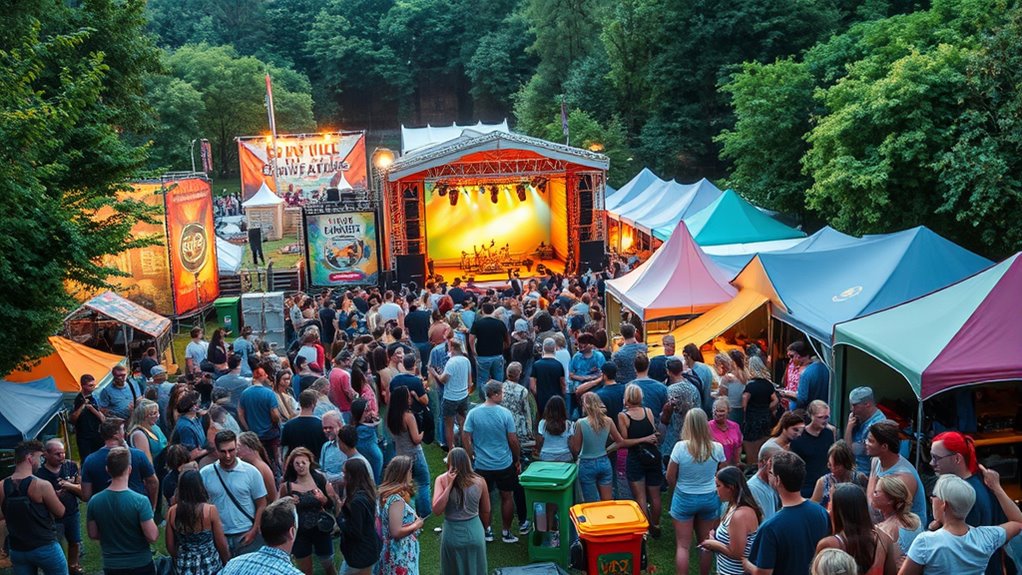Europe hosts numerous zero-waste music festivals that focus on sustainability through recycling, composting, and eco-friendly sourcing. You’ll find events promoting reusable materials, responsible waste management, and community engagement. Festivals like Glastonbury and Primavera Sound set the standard with innovative waste solutions and cultural traditions. If you’re curious about how these festivals operate sustainably and what future trends are emerging, explore how organizers are shaping greener festival experiences.
Key Takeaways
- Notable festivals like Glastonbury (UK) and Primavera Sound (Spain) implement comprehensive waste separation, composting, and recycling programs.
- Many European festivals promote reusable containers, biodegradable materials, and sustainable sourcing to minimize single-use plastics.
- Eco-education initiatives, workshops, and clear signage encourage attendee participation in waste reduction efforts.
- Collaborations with local organizations and community engagement are integral to achieving zero-waste goals at these festivals.
- Innovative waste management strategies include upcycling art installations, composting organic waste, and using smart waste systems.
The Rise of Sustainability in European Festivals
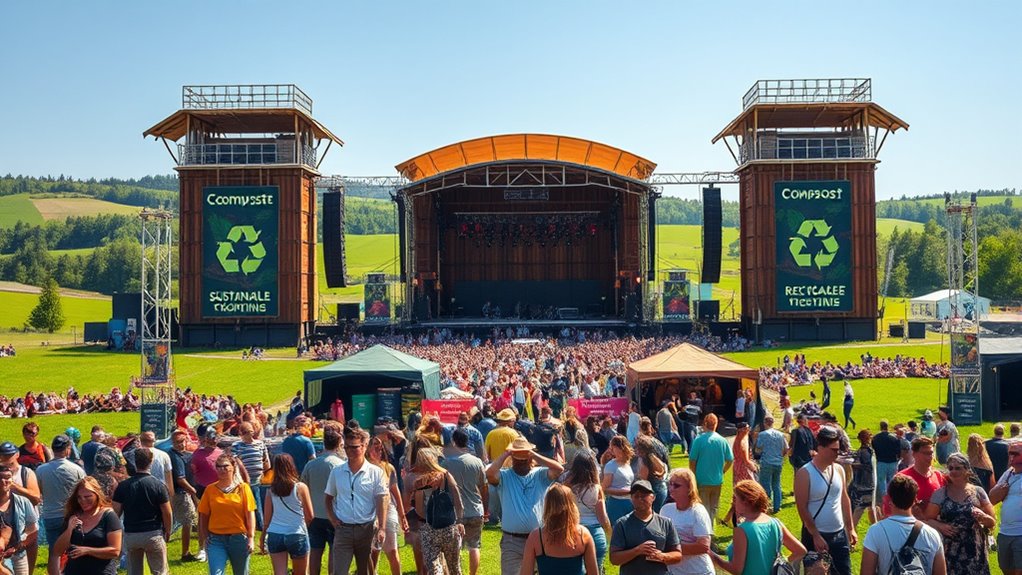
Over the past few years, sustainability has become a central focus for European festivals, driven by increasing awareness of environmental issues and climate change. You’ll notice festival organizers promoting eco-conscious choices, especially through festival fashion that encourages sustainable materials and ethical production. Attendees are embracing eco-friendly outfits, reducing waste, and supporting brands that prioritize sustainability. Additionally, eco education programs are now a staple, helping you understand your environmental impact and inspiring greener behaviors. These initiatives empower you to participate actively in reducing the festival’s carbon footprint. Incorporating cultural and regional traditions into festival programming can further promote diversity and sustainability. Together, these efforts reflect a shift toward more responsible event planning and a shared commitment to protecting the environment. As a festival-goer, your awareness and participation play a crucial role in fostering this sustainable movement.
Key Principles of Zero-Waste Event Planning
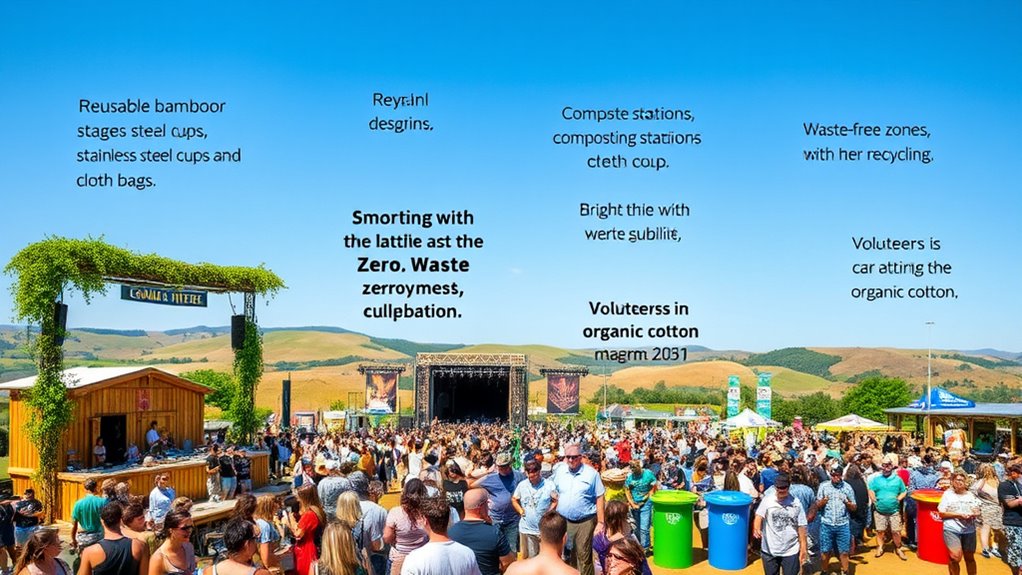
You play a vital role in implementing waste reduction strategies that minimize environmental impact. Focusing on sustainable resource management helps guarantee materials are reused or responsibly sourced throughout the event. By prioritizing these principles, you can create a zero-waste festival that truly sets an example for others. Embracing artistic expression and creativity can also inspire innovative ways to reduce waste and engage attendees in sustainable practices.
Waste Reduction Strategies
Effective waste reduction at zero-waste music festivals begins with careful planning and a commitment to sustainability. You should focus on educating attendees about recycling and composting techniques to minimize waste. Clear signage, workshops, and staff guidance help promote recycling education, ensuring proper disposal of waste. Composting stations for organic waste reduce landfill contributions and turn waste into valuable compost. To organize your strategies, consider this table:
| Waste Reduction Ideas | Implementation Tips |
|---|---|
| Recycling Education | Use signs and info booths to explain how to recycle properly |
| Composting Techniques | Set up accessible compost bins; train staff on compost management |
| Waste Sorting | Provide separate bins for recyclables and organics |
These steps make waste management seamless and keep your festival eco-friendly. Additionally, incorporating sound design techniques can help create engaging educational experiences that promote sustainability messages throughout the event.
Sustainable Resource Management
Sustainable resource management is the cornerstone of zero-waste event planning, ensuring that every resource is used efficiently and responsibly. You should prioritize renewable energy sources like solar or wind power to reduce carbon footprints. Water conservation is equally essential; implement measures such as low-flow fixtures and water recycling systems. Consider the following key principles:
- Use renewable energy to power the event
- Minimize water waste through efficient fixtures
- Opt for reusable or compostable materials
- Plan resource needs carefully to prevent excess
- Educate attendees about lifevest advisors and responsible resource use to promote sustainability awareness throughout the event.
Notable European Zero-Waste Music Festivals
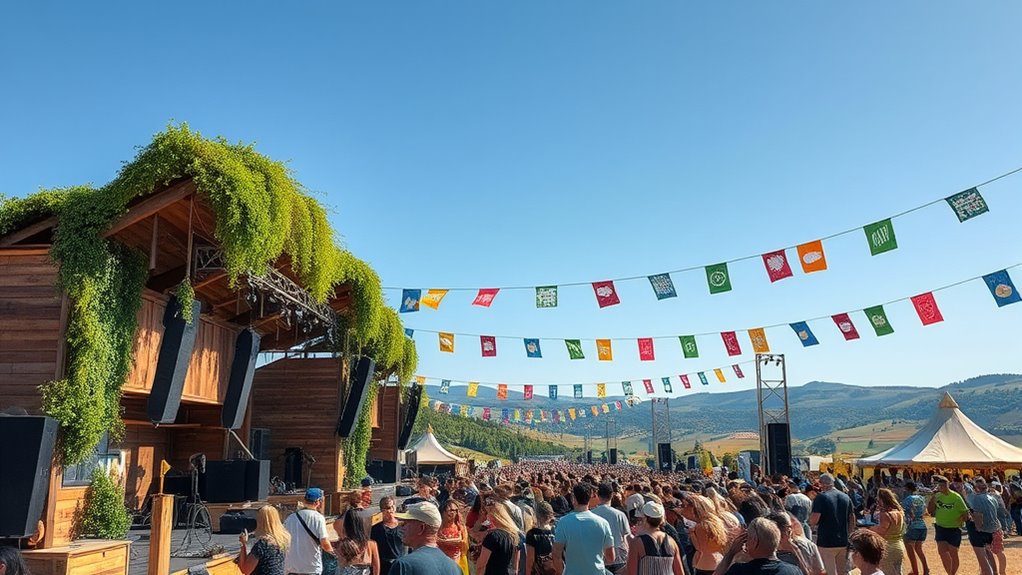
Have you ever wondered which festivals are leading the charge in zero-waste practices across Europe? Notable examples include the Glastonbury Festival in the UK and Primavera Sound in Spain. These festivals implement robust recycling initiatives, encouraging attendees to sort waste properly and reduce landfill contributions. They also employ composting techniques for organic waste, turning food scraps into valuable compost rather than trash. Such efforts considerably minimize environmental impact and set industry standards. Additionally, these festivals often provide clearly marked bins, educational signage, and volunteer support to promote waste awareness. By prioritizing recycling and composting, they demonstrate how large-scale events can effectively reduce waste. Moreover, waste management strategies are integral to achieving a truly sustainable, zero-waste festival, inspiring other organizers across Europe to adopt eco-friendly practices.
Innovative Waste Management Strategies

Innovative waste management strategies are transforming how music festivals handle their environmental footprint. You can see this through creative upcycling art installations, where discarded materials become eye-catching displays, inspiring sustainability. Many festivals implement composting programs that turn food waste into nutrient-rich soil, reducing landfill contributions. Additionally, some festivals encourage attendees to bring reusable containers and utensils, minimizing single-use plastics. Others organize waste separation stations to ensure proper recycling and composting. These strategies foster community engagement and awareness, showing how waste can be transformed into valuable resources. Implementing trusted custodians for waste management ensures proper handling and compliance with environmental standards. By combining upcycling art, composting programs, and active waste sorting, festivals drastically cut their environmental impact and promote eco-conscious behaviors among visitors. This innovative approach sets a new standard in zero-waste festival management.
Sustainable Sourcing and Eco-Friendly Materials
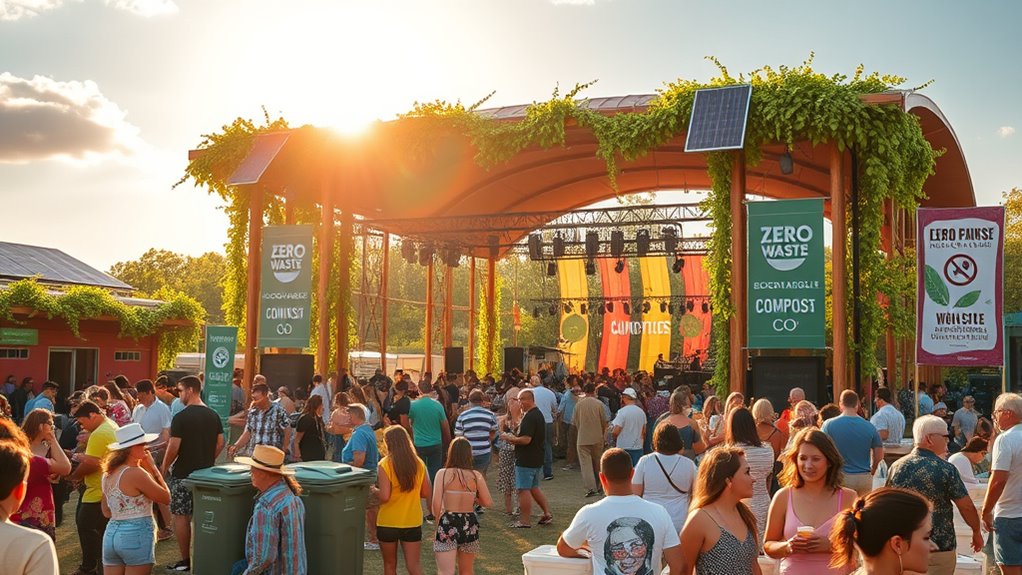
As festivals seek to minimize their environmental impact, they prioritize sourcing materials responsibly and choosing eco-friendly options. You’ll see organizers opting for recycled instruments, which reduce waste and give new life to old materials. These instruments not only support sustainability but also add a unique aesthetic to performances. Additionally, biodegradable stage sets are increasingly popular, breaking down naturally after the event without polluting the environment. Using eco-friendly materials extends beyond the stage—halls, signage, and vendor supplies often feature sustainably sourced or biodegradable options. By selecting these materials, you help cut down on plastic and non-renewable resource use. The adoption of pinball machines at some eco-conscious festivals showcases how innovative, energy-efficient entertainment options can also contribute to a sustainable event. Such conscious choices demonstrate a festival’s commitment to environmental health, inspiring attendees to *contemplate* their own consumption habits and fostering a greener festival culture.
Engaging Attendees in Eco-Conscious Practices
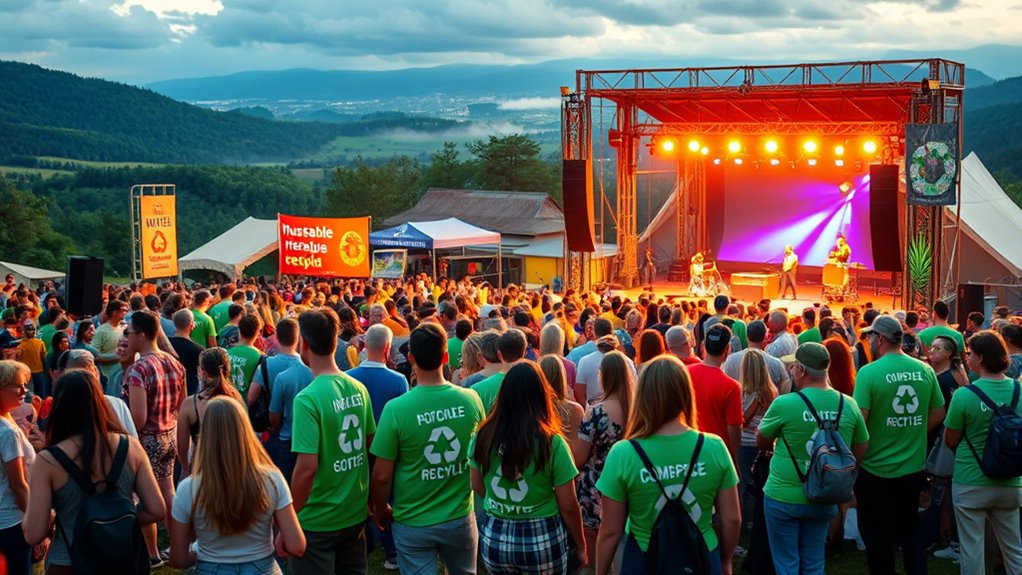
To truly make a festival sustainable, engaging attendees in eco-conscious practices is essential. Your participation can markedly reduce waste and promote awareness. Use eco conscious branding to inspire action and reinforce your message. Encourage attendee participation by offering incentives for eco-friendly behaviors. You can:
- Distribute reusable cups and encourage their use
- Set up composting stations and explain their importance
- Use signage that promotes sustainable choices
- Host interactive workshops on reducing waste
- Incorporate sustainable merchandise to further promote eco-friendly values among attendees
Partnerships and Collaborations for Sustainability
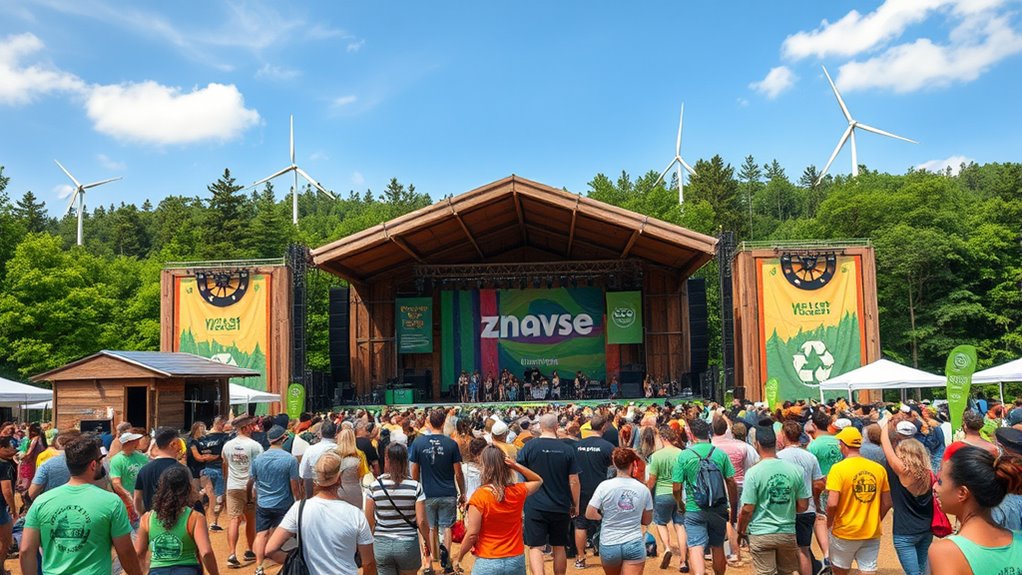
Partnering with local organizations and other festivals can amplify your sustainability efforts. By working together on community engagement strategies and cross-organizational initiatives, you create a stronger environmental impact. These collaborations make it easier to share resources, ideas, and best practices for zero-waste events. Incorporating safety considerations ensures that all activities adhere to health guidelines, further supporting sustainable practices.
Community Engagement Strategies
Building strong community partnerships is essential for making zero-waste music festivals sustainable, as collaborations bring together diverse stakeholders who share a commitment to environmental responsibility. Engaging local communities helps preserve local traditions and promotes cultural integration, making festivals more meaningful and authentic. To strengthen these efforts, consider:
- Involving local artisans and artisans’ cooperatives
- Incorporating traditional music and dance
- Collaborating with community groups on waste reduction initiatives
- Promoting local food vendors and sustainable sourcing
- Integrating Volkswagen Tuning techniques to optimize transportation and reduce emissions during festival logistics
Cross-Organizational Initiatives
Cross-organizational initiatives are essential for advancing sustainability in zero-waste music festivals, as they leverage the strengths and resources of diverse groups. By forming collaborative frameworks and cross-sector alliances, you can pool expertise, share best practices, and develop innovative solutions. These partnerships often involve festival organizers, local governments, environmental NGOs, and sponsors working together toward common sustainability goals. Such alliances foster knowledge exchange and create a unified front, making initiatives more impactful. The table below highlights key benefits of these collaborations:
| Benefit | Example |
|---|---|
| Resource Sharing | Joint waste management programs |
| Knowledge Exchange | Sustainability training workshops |
| Amplified Impact | Broader community engagement |
Building strong cross-organizational relationships is crucial to achieving truly zero-waste festivals.
Challenges and Opportunities in Zero-Waste Festivals
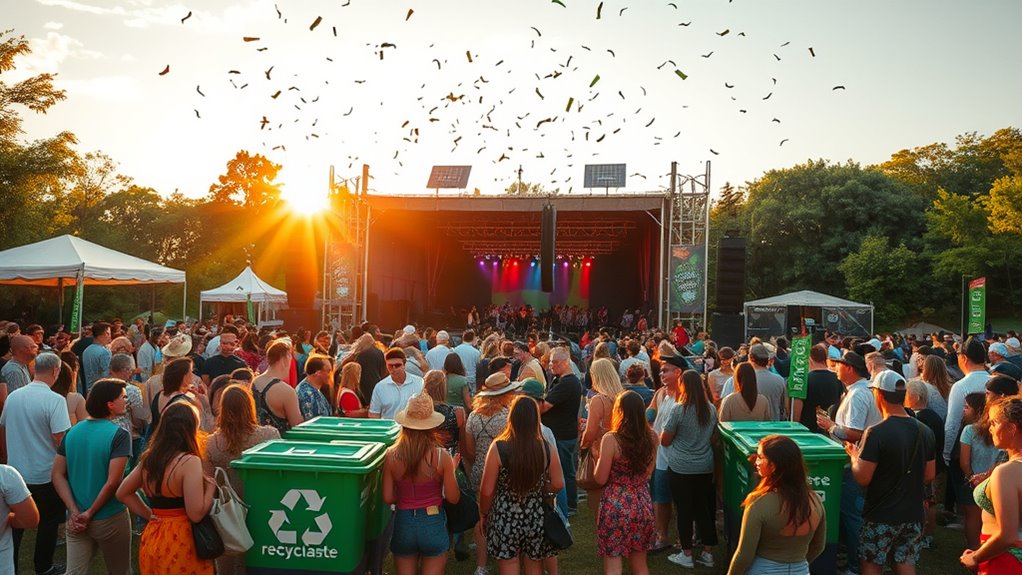
While zero-waste music festivals present exciting opportunities to promote sustainability and reduce environmental impact, they also face significant challenges that can hinder their success. Recycling challenges often stem from attendee behavior, which can lead to improper waste sorting and contamination. Changing habits requires effective communication and education, but not everyone may be receptive. Additionally, logistical issues like waste collection and composting can complicate efforts. You can seize opportunities by engaging attendees through clear signage, interactive campaigns, and incentivizing eco-friendly actions. Emphasizing community involvement and collaboration with local organizations can improve participation. Nonetheless, overcoming these hurdles demands ongoing commitment and innovation. By addressing attendee behavior and refining waste management strategies, you can help festivals become true models of zero-waste sustainability.
Measuring Impact and Success Stories

How do you know if a zero-waste music festival truly makes an impact? You look at its carbon footprint reduction, comparing emissions before and after implementing eco-friendly measures. Lower emissions indicate positive environmental change. Attendee satisfaction is equally essential; if festival-goers enjoy the experience while observing sustainability efforts, it suggests success. Surveys and feedback help measure this, revealing how well the festival balances fun and eco-consciousness. Successful festivals often share inspiring stories of waste reduction, renewable energy use, and community engagement. These stories motivate others to adopt similar practices. By tracking measurable data like reduced waste and emissions alongside attendee feedback, you can confidently assess whether the festival truly advances sustainability goals and fosters lasting change.
Future Trends in Eco-Friendly Festival Culture
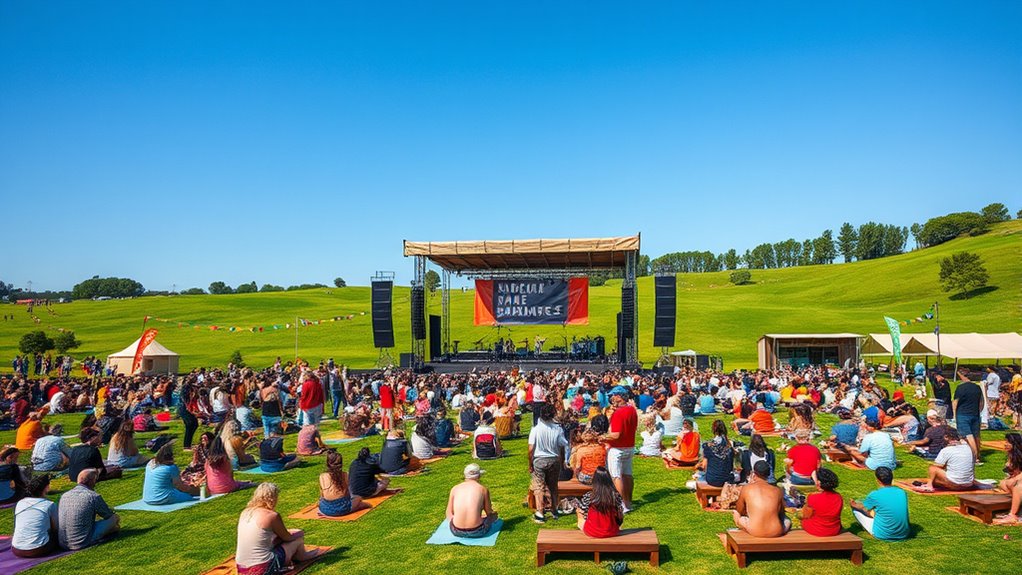
You’ll see new sustainable infrastructure innovations shaping how festivals operate, making them more eco-friendly from the ground up. Community engagement initiatives will become even more essential, fostering stronger connections and shared responsibility. Together, these trends will redefine what it means to host a truly green and inclusive festival.
Sustainable Infrastructure Innovations
Innovative infrastructure is transforming the future of eco-friendly music festivals across Europe, making sustainability more accessible and effective. You’ll see the rise of renewable energy sources like solar panels and wind turbines powering stages and facilities, reducing reliance on fossil fuels. Eco-friendly transportation options are also gaining momentum, encouraging festival-goers to use bikes, electric shuttles, and carpooling to lower emissions. Additionally, modular and biodegradable structures minimize waste and landfill impact. Smart waste management systems integrate composting and recycling stations seamlessly into festival layouts. Green water management solutions, such as rainwater harvesting and eco-friendly sanitation, further reduce environmental footprints. These innovations make it easier for festivals to operate sustainably while enhancing the attendee experience and inspiring wider adoption of eco-conscious practices.
Community Engagement Initiatives
As eco-friendly festival culture evolves, community engagement initiatives are becoming central to creating meaningful and sustainable experiences. You’ll see local volunteer programs encouraging attendees to participate actively, fostering a sense of shared responsibility. Artist participation also plays a key role, with performers engaging in eco-education or sustainability workshops, inspiring fans to adopt greener habits. These initiatives deepen connections, making festivals more than just entertainment—they become community-driven movements. Here’s a snapshot of common activities:
| Initiative | Impact |
|---|---|
| Local volunteer programs | Boosts community ownership and participation |
| Artist participation | Raises awareness and promotes sustainable practices |
| Interactive workshops | Educates attendees through hands-on experiences |
Frequently Asked Questions
How Do Zero-Waste Festivals Impact Local Communities Economically?
You might wonder how zero-waste festivals impact local communities economically. These events generate significant economic benefits by attracting visitors who spend on accommodations, food, and local businesses. They also promote community engagement, encouraging residents to participate in sustainable practices. This increased activity boosts local revenue and fosters a sense of pride. Overall, zero-waste festivals support economic growth while strengthening community bonds through environmentally conscious initiatives.
What Are the Main Barriers to Implementing Zero-Waste Practices?
Imagine breaking down a fortress wall—changing habits isn’t easy. You face barriers like a tricky supply chain that resists eco-friendly materials and the challenge of behavioral change among attendees and vendors. These obstacles create a tangled web, making zero-waste practices hard to implement. Overcoming them requires persistence, education, and collaboration. Only then can you turn the tide and embrace sustainable habits that reshape your event’s future.
How Do Festivals Handle Waste That Cannot Be Composted or Recycled?
When festivals face waste that can’t be composted or recycled, you typically see alternative disposal methods like dedicated waste treatment facilities or secure landfill options. Staff often sort waste on-site to separate non-recyclables or non-compostables, ensuring proper disposal. This process minimizes environmental impact, but it requires planning and resources. You play a role by supporting festivals that prioritize responsible waste management and advocate for improved waste treatment options.
Are Zero-Waste Festivals More Expensive to Organize Than Traditional Festivals?
They say “you get what you pay for,” but zero-waste festivals often require careful budget management. While initial cost considerations might be higher due to sustainable supplies and waste programs, they can save money long-term. Organizers may spend more upfront, but the environmental benefits and positive reputation can offset expenses. Overall, zero-waste festivals might be more costly initially, but smart planning balances the budget and enhances the event’s impact.
How Can Attendees Be Encouraged to Adopt Eco-Friendly Behaviors Long-Term?
To encourage long-term eco-friendly behavior change, you can focus on engaging sustainability education and inspiring personal responsibility. You might attend workshops, participate in community initiatives, or practice mindful consumption. By making eco-friendly choices visible and rewarding, you create habits that stick. Support organizations that promote sustainability, and share your progress with friends. These actions help embed sustainable behaviors into your daily life, making a lasting positive impact.
Conclusion
By embracing zero-waste festivals, you’re not just attending an event—you’re transforming the entire music scene into a powerhouse of sustainability. Every recycled bottle, eco-friendly stage, and conscious choice fuels a revolution so huge it could reshape our planet’s future. Your participation isn’t just a drop in the ocean; it’s the tidal wave that will drown pollution and ignite a global movement towards a cleaner, greener world. Together, you’re unstoppable.

